CHAPTER XV.
THE PEOPLE OVERTHROW THE GOVERNMENT OF THE KING.
"Believe us, great Sir, America is not divided; all men (Crown officers not excepted) speak of these acts and measures with disapprobation, and if there has been some difference of opinion as to the mode of relief, the rigorous experiments which your Ministry thought fit to try on the Americans have been the most effectual means to convince these of the iniquitous designs of your Ministry and to unite them all as in a common cause." --- Provincial Congress's Address to the King.
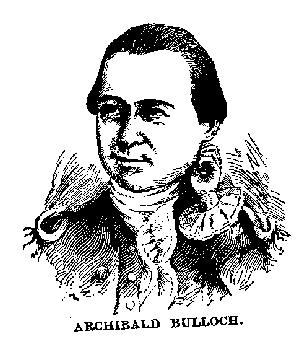 Governor Wright was alarmed at the way things looked in Georgia. He wrote a letter to the British general, Gage, asking for help. This letter was opened in South Carolina, the papers taken out, and another letter placed in the envelope, stating that Georgia was quiet and needed no help. Thus the royal government in Georgia had no aid from the British troops. The reason was not found out until years after, when Governor Wright, meeting General Gage in London, asked him why he had not sent soldiers to his relief.
Governor Wright was alarmed at the way things looked in Georgia. He wrote a letter to the British general, Gage, asking for help. This letter was opened in South Carolina, the papers taken out, and another letter placed in the envelope, stating that Georgia was quiet and needed no help. Thus the royal government in Georgia had no aid from the British troops. The reason was not found out until years after, when Governor Wright, meeting General Gage in London, asked him why he had not sent soldiers to his relief.
Governor Wright had good reason to be alarmed. Meetings were being held all over the province and delegates elected to another Provincial Congress, which a Council of Safety had called to meet at Savannah on the 4th of July, 1775. On that day every parish was represented and by its leading men. They came by authority of the people and in defiance of the authority of the king. Colonel C.C. Jones calls this congress "Georgia's first secession convention." The delegates met in the long room at Tondee's Tavern, and organized by electing Archibald Bulloch president of the congress, and George Walton secretary. Two days later resolutions were unanimously adopted, endorsing all that the Continental Congress had done, adopting the Bill of Rights published by that congress, forbidding all trade with England or with any province that did not agree to these resolutions, and binding themselves and their constituents, "by the ties of virtue, honor, and love of our country, to adhere to this association," until the objectionable acts of Parliament were repealed. A Council of Safety for the province was created, with power to act for the people when the Provincial Congress was not in session, and five delegates were elected to attend the Continental Congress then in session in Philadelphia. An address to the people of the province was prepared, setting forth what had been done in their name; also an address to the governor; and, as a last resort, a petition to the king, urging him to listen to the appeals of America.
While the Provincial Congress was in session, news came that a British ship would arrive shortly with fourteen thousand pounds of powder. The people made up their minds to capture this prize if they could. Commodore Bowen and Major Joseph Habersham, with a number of volunteers, went quietly down the river on a schooner armed and commissioned by the Provincial Congress. They boarded the ship as soon as it appeared off Tybee Island, and captured it. This was the first naval capture of the Revolution, and their schooner was the first war vessel commissioned by an American congress. Nine thousand pounds of powder were kept by Georgia, and five thousand sent to General George Washington, to help him drive the British from Boston.
Royal power was now at an end in Georgia. The militia companies met and expelled all royalists from their ranks. The Council of Safety elected by the Provincial Congress took charge of the affairs of the province. A battalion of soldiers was raised for defence against the British vessels and troops.
The Council of Safety ordered the arrest of Governor Wright and his assistants in January, 1776. Major Joseph Habersham undertook to do this aided by a few friends only. He went 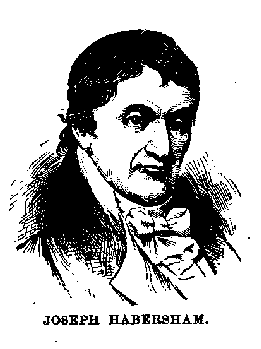 to the house of the governor, and, boldly entering, passed by the sentinel and found the governor surrounded by his council. Walking up to the governor, he put his hand on his shoulder and said: "Sir James, you are my prisoner." Thinking his captor was well supported, the governor surrendered, and the members of his council fled. A guard was placed over the house, but the governor escaped after three weeks, by stepping out of the back part of his house at night; and before his absence was discovered he was safe on board a British ship that was lying at the mouth of the river.
to the house of the governor, and, boldly entering, passed by the sentinel and found the governor surrounded by his council. Walking up to the governor, he put his hand on his shoulder and said: "Sir James, you are my prisoner." Thinking his captor was well supported, the governor surrendered, and the members of his council fled. A guard was placed over the house, but the governor escaped after three weeks, by stepping out of the back part of his house at night; and before his absence was discovered he was safe on board a British ship that was lying at the mouth of the river.
Another Provincial Congress met in Savannah on the 22d of January, 1776, and Archibald Bulloch was elected president. Five delegates were elected to represent Georgia in the next Continental Congress at Philadelphia, and a committee was appointed to buy arms and ammunition for the province. To pay for these, bills of credit were issued, and it was made a penal offence in Georgia to refuse to receive them or to depreciate their value. The most important work of this congress was the adoption of certain rules and regulations under which they organized a government. The first government organized by the people of Georgia was very simple. All the legislative power was in the hands of the Provincial Congress; courts were organized in the name of the people for the trial of cases, and the chief executive power was vested in a president. Acting under this temporary constitution, the Congress elected Archibald Bulloch president and commander-in-chief of Georgia, John Glenn chief-justice, William Stephens attorney-general, and James Jackson clerk of the court. Thus Archibald Bulloch, the distinguished patriot, who had been president of both Provincial Congresses, had the honor of being elected the first president of the first republican government organized on Georgia soil.
A number of vessels loaded with rice lay at the landing opposite Savannah, but under the regulations of Congress, were not permitted to sail. Fearing these vessels would slip away, Captain Rice was detailed to disable them. British ships of war lay at the mouth of the river, and one night troops from these ships seized several of the vessels lying opposite Savannah. Captain Rice boarded one of the vessels the next morning and was captured by the British. When the people heard of this they were much excited. Colonel McIntosh, with three hundred men and several cannon, marched down to Yamacraw Bluff opposite the vessels and sent two officers to demand the release of Captain Rice. But these officials were also seized and held prisoners. Colonel McIntosh, through a speaking trumpet, demanded the return of his men. This was refused and a number of shots were exchanged, but the British remained in possession of the vessels.
The Council of Safety ordered the vessels in the harbor to be set on fire in order to drive away the British troops. The ship Inverness was set on fire and cut loose. It drifted against the brig Nelly, which also took fire. These two burning ships drifted among the vessels which had been seized by the British. Several of these vessels caught fire and men and officers jumped overboard, some being drowned and others captured. Two ships escaped to the mouth of the river, carrying the Georgia officers with them. The Council arrested the royal chief-justice and other royalists and held them as hostages for the return of Rice and the other officers. After a long delay the officers were exchanged. South Carolina sent four hundred and fifty soldiers under Colonel Bull to help Georgia during this time.
August 10, 1776, news of the Declaration of Independence reached Georgia. 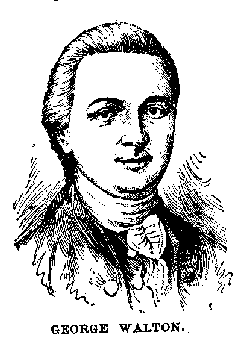 It had been signed at Philadelphia, July 4th, by the delegates of the thirteen colonies. George Walton, Button Gwinnett, and Lyman Hall signed on behalf of Georgia. It took a long time for news to travel in those days. It had to be carried by men on horseback or in stages which could not go more than thirty or forty miles a day. When the news did reach Georgia it was received with great joy. A liberty flag was run up to the top of the liberty pole, at the base of which the Declaration was read by President Bulloch to great crowds of people, who shouted themselves hoarse with excitement. A great procession paraded the streets, the batteries and the ships fired salutes, a banquet was given, and the royal government was buried with muffled drum and trailing arms. At night speeches were made and bonfires lighted in the streets.
It had been signed at Philadelphia, July 4th, by the delegates of the thirteen colonies. George Walton, Button Gwinnett, and Lyman Hall signed on behalf of Georgia. It took a long time for news to travel in those days. It had to be carried by men on horseback or in stages which could not go more than thirty or forty miles a day. When the news did reach Georgia it was received with great joy. A liberty flag was run up to the top of the liberty pole, at the base of which the Declaration was read by President Bulloch to great crowds of people, who shouted themselves hoarse with excitement. A great procession paraded the streets, the batteries and the ships fired salutes, a banquet was given, and the royal government was buried with muffled drum and trailing arms. At night speeches were made and bonfires lighted in the streets.
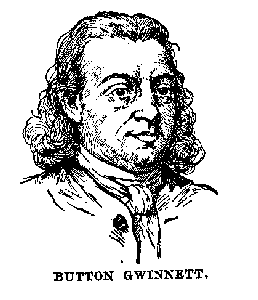
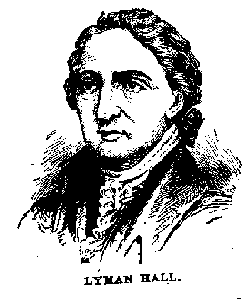
[In July, 1775, Archibald Bulloch, John Houstoun, Rev. Dr. Zubly, Dr. Lyman Hall, and Dr. Noble Wimberly Jones were elected delegates to the Continental Congress at Philadelphia. Dr. Lyman Hall and Dr. Noble Wimberly Jones were detained at home, but the other delegates took their seats on the 13th of September. Dr. Zubly had been a leader in opposition to the acts of Parliament, but his plan was for the provinces to force a repeal of these acts and a recognition of their constitutional rights, after which they should renew their allegiance to the king. He found, however, on reaching Philadelphia, that the delegates were determined upon establishing a republic, and that his colleagues, Messrs. Bulloch and Houstoun, were heartily supporting this plan. His heart failed him, and he wrote to Governor Wright, telling him what was proposed. He was suspected, watched, and one of his letters seized. When Chase of Maryland alluded to this fact, Dr. Zubly abandoned his seat and returned to Georgia. He was banished from Savannah, but returned after that city was captured by the British, and died there in 1781.]
[In January, 1776, Archibald Bulloch, John Houstoun, Dr. Lyman Hall, Button Gwinnett, and George Walton were the delegates to the Continental Congress. Bulloch, being President of Georgia, could not leave the State, and John Houstoun was detained at home. They thus lost the honor of being among the signers of the Declaration of Independence with the other Georgia delegates.]
History of Georgia
Main page
You are visitor  since Dec 2014 -- thanks for stopping by!
since Dec 2014 -- thanks for stopping by!There were 1325 visitors, at our previous host from 23 Jun 2004 to 9 Aug 2011.
Last updated: 19 Jan 2015
© Copyright 2003 - 2015 - Tim Stowell
 Governor Wright was alarmed at the way things looked in Georgia. He wrote a letter to the British general, Gage, asking for help. This letter was opened in South Carolina, the papers taken out, and another letter placed in the envelope, stating that Georgia was quiet and needed no help. Thus the royal government in Georgia had no aid from the British troops. The reason was not found out until years after, when Governor Wright, meeting General Gage in London, asked him why he had not sent soldiers to his relief.
Governor Wright was alarmed at the way things looked in Georgia. He wrote a letter to the British general, Gage, asking for help. This letter was opened in South Carolina, the papers taken out, and another letter placed in the envelope, stating that Georgia was quiet and needed no help. Thus the royal government in Georgia had no aid from the British troops. The reason was not found out until years after, when Governor Wright, meeting General Gage in London, asked him why he had not sent soldiers to his relief.
 to the house of the governor, and, boldly entering, passed by the sentinel and found the governor surrounded by his council. Walking up to the governor, he put his hand on his shoulder and said: "Sir James, you are my prisoner." Thinking his captor was well supported, the governor surrendered, and the members of his council fled. A guard was placed over the house, but the governor escaped after three weeks, by stepping out of the back part of his house at night; and before his absence was discovered he was safe on board a British ship that was lying at the mouth of the river.
to the house of the governor, and, boldly entering, passed by the sentinel and found the governor surrounded by his council. Walking up to the governor, he put his hand on his shoulder and said: "Sir James, you are my prisoner." Thinking his captor was well supported, the governor surrendered, and the members of his council fled. A guard was placed over the house, but the governor escaped after three weeks, by stepping out of the back part of his house at night; and before his absence was discovered he was safe on board a British ship that was lying at the mouth of the river.
 It had been signed at Philadelphia, July 4th, by the delegates of the thirteen colonies. George Walton, Button Gwinnett, and Lyman Hall signed on behalf of Georgia. It took a long time for news to travel in those days. It had to be carried by men on horseback or in stages which could not go more than thirty or forty miles a day. When the news did reach Georgia it was received with great joy. A liberty flag was run up to the top of the liberty pole, at the base of which the Declaration was read by President Bulloch to great crowds of people, who shouted themselves hoarse with excitement. A great procession paraded the streets, the batteries and the ships fired salutes, a banquet was given, and the royal government was buried with muffled drum and trailing arms. At night speeches were made and bonfires lighted in the streets.
It had been signed at Philadelphia, July 4th, by the delegates of the thirteen colonies. George Walton, Button Gwinnett, and Lyman Hall signed on behalf of Georgia. It took a long time for news to travel in those days. It had to be carried by men on horseback or in stages which could not go more than thirty or forty miles a day. When the news did reach Georgia it was received with great joy. A liberty flag was run up to the top of the liberty pole, at the base of which the Declaration was read by President Bulloch to great crowds of people, who shouted themselves hoarse with excitement. A great procession paraded the streets, the batteries and the ships fired salutes, a banquet was given, and the royal government was buried with muffled drum and trailing arms. At night speeches were made and bonfires lighted in the streets.

